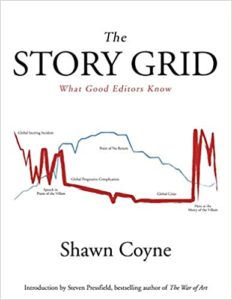
I’ve been listening to fledgling novelist Tim Grahl interview Shawn Coyne on The Story Grid Podcast. Shawn’s been an editor for over thirty years and is the author of The Story Grid; What Good Editors Know. I highly recommend these podcasts for more advanced writers (someone with at least one finished manuscript).
One thing Shawn says that strikes me as obvious but also brilliant is — the actions of the characters are the best way to describe who they are.
There are numerous books, websites, spreadsheets, and exercises devoted to creating characters, many of which focus on the characters’ looks, occupations, family backgrounds, etc.
In fact, in my workshop on character, I hand out a blank character sketch sheet and suggest writers fill in such things as the character’s race, eye color, hair style, build, style of dress, mannerisms, and flaws. I tell writers to use this more as a brainstorming exercise for those moments when they get stuck, hoping it might trigger something.
But as Tim points out in the podcast, Shawn doesn’t have anything like a character sketch in his book. Instead, Shawn urges writers to put characters in situations that force them to make a decision. What they decide and how they act will tell the reader who they are.
 Honestly, I judge political candidates that way and I bet many of you do, too. Politicians will say anything to get elected so I generally ignore their promises. Instead, I look at their actions. What have they achieved? Oftentimes, it’s how I view non-politicians as well. I’ve met people who say they’ll do something (volunteer for a cause, write a book) and then never get around to doing it.
Honestly, I judge political candidates that way and I bet many of you do, too. Politicians will say anything to get elected so I generally ignore their promises. Instead, I look at their actions. What have they achieved? Oftentimes, it’s how I view non-politicians as well. I’ve met people who say they’ll do something (volunteer for a cause, write a book) and then never get around to doing it.
To paraphrase Abraham Lincoln, their actions speak louder than their words.
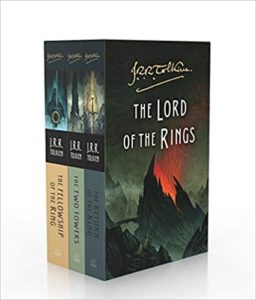
The same goes for characters. For instance, in Gone with the Wind, will Scarlett O’Hara marry Charles Hamilton just to spite Ashley? Will Samwise Gamgee carry Frodo up Mount Doom in Lord of the Rings? Will Katniss Everdeen volunteer to take her sister’s place in the Hunger Games, putting her own life at risk? Yes, yes, and yes. Their actions tell us a lot about them. We don’t need to know that Scarlett has green eyes, Sam has blond hair, or Katniss is five feet seven inches tall.
But isn’t description important? Don’t we need to know the style of dress Scarlett wore before the war? That hobbits have leathery feet? That Katniss is a great shot with a bow and arrow? Yes, description is important — when it serves a purpose.
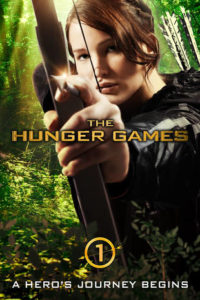
Margaret Mitchell described Scarlett’s pre-war dresses in detail — their color, materials, the addition of lace and ribbons, etc. Knowing the expense and beauty of these dresses makes it more poignant when Scarlett is reduced to making a dress out of curtains.
Sam and Frodo get to the top Mount Doom barefoot–symbolizing their toughness and resiliency.
And Katniss uses her archery skills for survival.
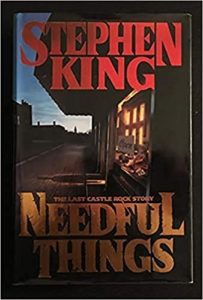 I’m currently reading Needful Things by Stephen King and am getting to know Leland Gaunt, a character who I’m sure will become one of my favorite villains. Mr. Gaunt is a charming shopkeeper who sells customers the exact items they need in return for a few bucks and a favor. Are they making a deal with the devil? I’m truly worried for them.
I’m currently reading Needful Things by Stephen King and am getting to know Leland Gaunt, a character who I’m sure will become one of my favorite villains. Mr. Gaunt is a charming shopkeeper who sells customers the exact items they need in return for a few bucks and a favor. Are they making a deal with the devil? I’m truly worried for them.
And then there’s the description of Mr. Gaunt’s eyes. Each customer is intoxicated by those eyes, but each see a different color. That simple discrepancy cues me into Guant’s fantastical and possibly sinister nature.
What readers tend to remember most though are the actions of the characters, particularly if the characters react to tight situations in unexpected ways.
That’s when a good book becomes unforgettable.
Great Gift Idea

For my daughter Jessica’s birthday, she asked the everyone to buy her their favorite book (one they thought she hadn’t read) and write in it why they picked it. We had the best time selecting the books and then seeing what everyone gave her: The Poisonwood Bible, Zen and the Art of Motorcycle Maintenance, Flowers for Algernon, Lord of the Rings, Kitchen Confidential, Red Rising, World War Z, Of Mice and Men, The Hidden Life of Trees, and more.
I think this will become a new family tradition for all of us. I can’t wait until my birthday!

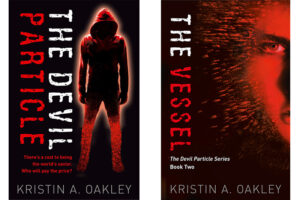
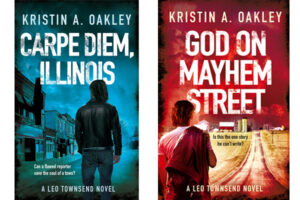


I was just listening to Walter Mosley’s MasterClass and he had much the same thing to say about characters being defined by what they do – our job as novelists is to put them in situations and in interaction with others that will give us a chance to reveal those aspects of them that the reader needs to know to understand their actions. Not as easy as it sounds! PS love the birthday idea although I bet you will be harder to pick for as my guess is you’ve read a lot of books!
Hi Maggie:
It’s good to hear from you. Sounds like a good MasterClass. Defining the characters by their actions is tough, but I think it’s like everything with writing (and with life), the more you do it, the easier it becomes.
Kristin
P.S. I have read a lot of books, but there are always so many more!